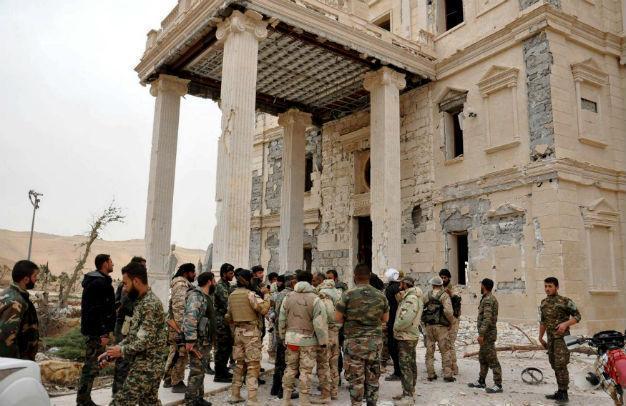Syrian army advances against ISIL in Palmyra
DAMASCUS – Agence France-Presse

REUTERS photo
The Islamic State of Iraq and the Levant (ISIL) suffered a double setback in Syria on March 25 as army troops recaptured the ancient citadel in Palmyra and the Pentagon said the jihadists’ second-in-command was killed in a U.S. raid.
The fresh gains in Palmyra by Syrian troops backed by allied militia and Russian warplanes came nearly a year after ISIL overran the UNESCO world heritage site, sparking global concern.
The regime advance came after U.S. Secretary of State John Kerry and Russian President Vladimir Putin agreed to intensify the drive for a political settlement in Syria.
“Our armed forces, in coordination with the popular defense forces, have taken control of the ancient Palmyra citadel after inflicting many losses in the ranks of the terrorist group Daesh,” Syrian state television said, using an Arabic acronym for ISIL.
The army has also cut off the main Palmyra-Deir Ezzor highway leading to the Iraqi border, the report said citing a military source.
The jihadist group had taken over the citadel on May 23, 2015 and raised its notorious black and white flag over it.
The group has since blown up UNESCO-listed temples and looted relics that dated back thousands of years, and murdered the former antiquities chief in Palmyra, Khaled al-Assaad.
Built in the 13th century, the citadel is Palmyra’s main Islamic-era monument.
The Syrian Observatory for Human Rights, a Britain-based monitor, reported that Russian and Syrian warplanes were continuing air strikes in the area.
“The army is now 600 meters from the Temple of Bel, but it is advancing slowly because of mines and above all to protect the city, which is an ancient treasure,” Abdelkarim said.
One day before the recapturing of Palmyra, Kerry and Putin agreed to intensify the drive for a political settlement in Syria but remained divided over Syrian President Bashar al-Assad’s future.
After four hours of talks at the Kremlin, Kerry said the United States and Russia had found common ground on the Syrian peace process and on taking the fight to ISIL.
“Russia will have to speak for itself as what it’s going to choose to do in order to help Mr Assad make the right decisions, but we agreed today... that we will try to accelerate the effort to move the political process forward,” Kerry said.
“We agreed on a target schedule for establishing a framework for a political transition and also a draft constitution, and the target is August,” Kerry said at a joint news conference with Foreign Minister Sergei Lavrov after the talks.
Lavrov told journalists that Moscow and Washington would now step up efforts to get the Syrian regime and opposition to hold “direct talks” in Geneva, where a round of negotiations that saw a United Nations mediator shuttle between the delegations concluded on March 24. The new round of talks are set to begin on April 9, UN’s special envoy Staffan de Mistura said.
“As the immediate task we have agreed to push for the soonest start of direct talks between the government delegation and the whole spectrum of the opposition,” Lavrov said, calling for “a transitional governance structure” in the war-torn country.
Putin did not attend the final news conference, but he had unexpectedly warm words for the United States’ role in Syria at the start of the Kremlin encounter.
“We understand that what we have managed to achieve on Syria has only been possible thanks to the constructive position of the political leadership in the U.S., the position of [U.S.] President [Barack] Obama,” Putin said.
